- Home
- Julian Barnes
Love, Etc. Page 8
Love, Etc. Read online
Page 8
Three, if it is true that Oliver hated his father—I think this is an exaggeration, it was certainly a strong antagonism, but let us call it hate if you will—and if that emotion had continued during all his adult life, then perhaps in a sense it had become necessary to him. Perhaps he was sustained by it as certain people are sustained by indignation or sarcasm. So what do you do when it is taken away? Of course you can continue hating the dead person, but part of you will know that this is not reasonable, is even a little bit crazy. And four, there is the question of silence. Your parents are gone, death is coming for you next, you are on your own—even if you have your family, your friends. You are supposed to be adult now, grown up. You are at last free. You are responsible for yourself. You look at that self, you examine it, intimately, finally without the fear of what it is your parents can say or can think. What if you do not like what you see? And now there is a new silence—the silence outside, which is as big as the silence inside. And you—you who are so fragile—you are all that is holding these two great silences apart. You know that when they meet you will cease to exist. Your skin is all that keeps them apart, your thin skin, which has such porosity. Why would you not go a little crazy?
No, it did not surprise me.
Ellie Guess who Gillian and Oliver tried to fix me up with? Or who was at supper, anyway? Mr Mystery Man with no pictures on his wall, aka Mr Henderson. This grey-haired man standing there, then moving towards me a bit quickly and shaking my hand as if we’d never met before. With a look in his eye like, let’s keep this a secret. So I went along with it. Which felt more and more weird as I sat there because—guess what?—it turned out he was an old friend of theirs.
So what was the mystery about? If he wanted a picture restorer, why didn’t he just ask Gillian?
Still, he was quite interesting. Talked about real things, if you know what I mean. Oliver kept making stupid jokes. So what else is new? I got the feeling there’s something about Stuart that really pisses him off. Well, good.
Stuart I read more than I used to. Non-fiction. History, science, biography. I like to know that what I’m being told is true. From time to time I’ll read a novel, if there’s one people are going on about. But stories aren’t enough like life for me. In stories, someone gets married and that’s the ending—well, I can tell you from my own personal experience that this isn’t the case. In life, every ending is just the start of another story. Except when you die—that’s an ending that’s really an ending. I suppose if novels were true to life, they’d all end with all the characters dying; but if they did, we wouldn’t want to read them, would we?
What I’m trying to say is this: when I saw—when you and I both saw—Oliver roaring off down that village street in France some ten years ago, you didn’t think that was the end of the story? I wouldn’t blame you—part of me thought it was too. Maybe I wish it had been. But life never lets you go, does it? You can’t put life down the way you can put a book down.
Oliver Stuart, at dinner, was at his most Stuartesque. St Simeon the Stylite would have thrown a wobbly and built his pillar even higher to escape the narcoleptic miasma that encircled the table legs like dry ice. It took me back to the time when—in a vain attempt to get Stu-baby up to speed in matters erotic—I would allow him on double-dates with me. He would sit there with all the animation of a breadstick and mope up a storm when both the signorine chose to be squired home by Yours Truly. I suppose this did furnish the Steatopygous One with some vague social purpose: ease your passage towards troilism by going on a double-date with Stuart! Though there were disadvantages. He used to get all whiney about picking up the bill (he should be so lucky), and then you’d have to smoothe his fur and feathers before he pattered off to catch the night bus back to his crepuscular wankpit.
Item: Stuart clearly feels he has upped the savoir faire quotient in the last decade. But if on a social occasion you are the only spare male present, it is, is it not, mere good manners to make preliminary enquiries of the only spare female present? As in: ‘What do you do for a living?’ ‘Are you Schedule D or Schedule E?’ ‘Which tax office do you make your returns to?’ But he just stared at Mlle Ellie as if he was having trouble with his contact lenses. After a while I stepped in and provided her brief cv. Which sent him to the opposite extreme, rabbiting on about the global food economy and his mission to vend carrots as authentically gnarled as the Devil’s genitalia.
Item: he spent a long time helping Gillian ‘clear away.’ Rather touching of him to load the dishwasher, but the offstage close-harmony tinkle of forks cascading into their little stacking nooks isn’t what I call singing for one’s supper.
Item: at one point he came over all rheumy and choleric about the fact that both fiction and non-fiction might hunker down together on the person of sensibility’s bookshelf. Furthermore, he railed, why was non-fiction patronisingly defined and named merely in terms of its opposite? Was it not as if fruit were defined as non-vegetables? Or—just in case we were slow to catch the inference—as if vegetables were defined as non-fruit?
Fiction, I replied, is the Supreme Fiction. Non-fiction is the dross on the fool’s gold (whatever that means; but I do like the sound of it). He wasn’t following very well. Look, I said, fiction—by which I was naturally referring to art in general—is the norm, the bass line, the golden mean, the meridian, the north pole, the north star, the pole star, the lodestone, the magnetic north, the equator, the beau idéal, the summum, the epitome, the ne plus ultra, the shooting star, the Halley’s Comet, the Star of the East. It is both Atlantis and Everest. Or, if you wish it more Stuartly, it is the white line down the middle of the road. Everything else is a deviation, a traffic light, a speed camera popping up in your rétroviseur.
He thought about this for a while, then chanted, ‘You only fit double glazing once, so fit the best—fit Ev-er-est!’ Then he grinned at me.
Sometimes my patience is sorely tested. St Oliver, who suffered little bores to come unto him.
Gillian I couldn’t believe it when Oliver told me he’d asked them to supper. Just the two of them, to make it really subtle. I washed my hands of it. Asked what he was going to cook. We had Curry in a Hurry. And, as I said, Oliver doesn’t really like Indian food. I can’t say I made much of a contribution myself. Stuart did his best. Then he helped me clear up. He stacks dishes with a care that is almost like tenderness. I even noticed him straightening out some of those plastic-covered prongs in the machine, which always end up pointing the wrong way if Oliver goes anywhere near it. At one point he said, not exactly in an undertone, but sort of quietly, yet firmly, ‘I think we’ve got to change this.’
‘Stuart,’ I said, ‘it’s a bit old, but it works perfectly well.’
‘No, not the dishwasher. The whole thing. You can’t go on like this.’
Stuart My plan is as follows:
they all need more space
the schools around here aren’t up to much
Gillian needs a bigger studio
Oliver needs to get off his arse
so in short they need a decent-sized house in an area where the schools are better
funnily enough, I happen to own such a house
which is the solution
though I can also see it might be a bit of a problem.
I have to persuade Oliver that it’s largely for Gill’s benefit, and Gill that it’s largely for Oliver’s. And both that it’s better for the kids. Well, that shouldn’t be impossible. I softened Oliver up when I last had a drink with him. I think I only wanted to strangle him on two occasions. He got out of control with some silly joke about Beer-Ritz, which he thought was blindingly original. As if there weren’t a couple of well-known off-licences in Yorkshire bearing that name already. And then, as we were leaving, he came over all sentimental as he’s inclined to when he’s a bit pissed. ‘Hey Stuart, me old mucker, no hard feelings, eh? Blood brothers and all that? A Roland for an Oliver, all blood under the bridge, no hard feelings, eh?’
<
br /> I suspect that Oliver’s notion of how I am going to help him contains various elements that are missing from my actual plan.
Ellie There was a weird moment the other evening. Oliver had been whacking on about art in his usual way, lecturing two of us who actually have degrees or diplomas in the subject, not that he’d notice, and all of a sudden Stuart put on this funny voice and did an ad for double-glazing. From a few years back, by the sound of it. It was surreal. You could see from Oliver’s face that he was really pissed off. And if you ask me, Stuart knew exactly what he was doing.
Gillian was a bit frosty with all concerned.
Oliver Stuart is behaving as if his Famous Plan were designed to pull the tiger economies out of a tailspin. Actually, he’s acting more like one of those insufferable Dickensian rescue-package artisans. Usually called Cherrybum or something equally preposterous.
Mme Wyatt There is one thing about the return of Stuart which makes me unquiet. Above all, if he becomes involved inside the family again.
You see, Sophie and Marie do not know that their mother was married before.
Absurd, yes? Not of our times, yes?
It was like so. Oliver and Gillian had abandoned their life in England, they had moved to France. Stuart had gone into exile in the United States. The little one—Sophie—was growing up, she was asking all the questions little ones ask. Now my daughter, as you have perhaps observed, is a very direct person. So whatever Sophie asks, she receives the answer. Where babies come from, where the cat goes when he dies, and so on. Well, as it happens, the one question Sophie did not ask because it is not the sort of question that comes into the minds of the little ones, was: just out of interest, Maman, were you ever married to anyone else before you were married to Daddy? So you see, it never arose.
Of course it was more than this. Perhaps it was a way of not thinking about the past. Also, a way of not making life seem too complicated for your child. We all want our children to believe that their point of entry into the world was a strong and a simple matter. Why place difficulties upon the little ones unless they are necessary?
And then it becomes harder to tell what you have not told. And then Marie is born. And you do not expect ever to see Stuart again. But he returns.
Perhaps it does not matter. Perhaps they will laugh together about it one day. Perhaps that is not so likely.
Gillian Look, can we stop this whole business right here?
I said to Oliver, ‘Do you realise exactly what Stuart is proposing? He’s proposing that we take over the house he and I lived in when we were married to each other.’
Oliver said, ‘You mean the house where we fell in love? Entirely appropriate, from my point of view.’
‘Why’s he still got it after all these years? Don’t you think that’s peculiar?’
‘No, I think it’s purely mercantile. He’s probably making doubloons out of renting it.’
‘So what’s going to happen to the tenants? He’s just going to throw them out?’
‘I think you’ll find that if the freeholder wants to repossess with the intention of making the property his principal residence, there’s no objection in law.’
‘That’s not the sort of thing you know.’
‘No, it’s the sort of thing Stuart knows.’
‘Anyway, that’s not what’s happening. He’s not going to move in, so he’d be evicting them dishonestly. What would they think?’
‘They’d probably think he was being mercantile.’
‘Can’t you see there’s something sick about the idea?’
‘Half the house used to be yours. He bought you out. Now you’re getting it back.’
‘No, I mean sick in that I used to live there with Stuart and now Stuart is proposing that I live there with you.’
‘And the children. Anyway, I expect the wallpaper has changed.’
‘Is that all you can think about—wallpaper?’
Oliver Wallpaper, you know, can be so nipple-puckeringly poignant. One of my artist-heroes, when in plump and non-Stuartesque middle-age, found himself visiting the Mediterranean city where, half a lifetime before, one of his primal encounters with Venus had taken place. Marseilles, as memory serves. Erotic nostalgia and wry self-curiosity sent him questing for that half-forgotten location, but the quixotries of memory and urban redevelopment betrayed him. Wearily coming upon a barber’s shop, he decided to abandon his search and have himself shaved instead. Lather white-bearded his cheeks and the barber was Paganiniing his strop when, and tout d’un coup and merde alors!, he recognised the wallpaper. Faded now, but proof that it had been here, in this very room, that the tumultuous event had occurred. Imagine such a moment: the old man’s face in the mirror, the young man’s paper on the wall, and in between the person he then was, assailed by both retrovision and preview. Must have made the old throat knock against the razor, eh?
When I told this to Gillian, she asked how my hero could have been sure it was the same room, as there can’t have been that many different kinds of wallpaper on sale at the time, and no doubt dozens of houses in the same area must have had . . .
I told her truth sprang directly from poetry.
Stuart Oliver rang to say that the only stumbling block for Gillian, as far as he could see, was the wallpaper. Aren’t people odd about where they live?
They’ll need another dishwasher. The old one was on its last legs.
Sophie Daddy says we’re moving somewhere nice and bigger. Mummy says we aren’t.
I asked if we can afford it, and they pretended not to hear.
So I asked if we could have a cat if we moved somewhere bigger.
They said they’d see about that.
Marie Pluto the Cat. Pluto the Cat.
Ellie Oliver rang to tell me that Stuart really liked me but that he was fantastically shy and I might have to make the first move. Oliver spent about twelve minutes wrapping it up. I replied that Stuart seemed a nice enough person, but that middle-aged divorcees weren’t exactly my scene. I took about eight seconds to say it and didn’t wrap it up.
Stuart Oliver rang to say that Ellie really liked me but was fantastically shy and I might have to make the first move. I told him that the only ‘move’ I had in mind was for him and Gillian. He called me various things like a sly dog and said he could tell we really liked one another.
Why does Oliver think I still need his help with the opposite sex? Not that he was ever much use in the old days. Very occasionally we went on dates together, but he always behaved in such a patronising manner that pretty soon I called it a day. I don’t mind being teased, but with Oliver it would degenerate into a sort of drunken aggression. And his idea of helping me was to go on about how much I needed help. Which in the circumstances wasn’t helpful.
And I certainly don’t need Oliver now. I’m quite capable of noting for myself that Ellie is a young and attractive woman. I also know how to use the telephone.
Another advantage of moving is that they might get a better class of home-delivery curry.
Oliver Mr Cherrybum sent me a newspaper clipping to the effect that some Government steward might be sent in to ‘manage’ the local schools, i.e., put down armed rebellion and make drug use optional rather than compulsory. The docent authority hereabouts is apparently on a par with Mr Tim’s academy in the matter of product delivery and staff morale.
Look, I don’t need any convincing. Madame is the decision-maker around here, we all know that. I am a mere Papal State parlaying with Metternich.
Stuart Oliver told me I had to sort it out with Gillian. That’s one from the Department of Unnecessary Advice. We had lunch. The first thing she said, which struck me as typical Gillian, was that she wasn’t going to accept charity. I told her I’d been intending to go Dutch anyway.
That’s the thing about her: you know where you stand. I realise this might seem an odd thing for me to say, given our marriage. But when I look back on it—as I frequently do—I can’t see that she actually decei
ved me. She may have deceived herself, but that’s another thing. When I asked her, she told me how things stood. When we broke up, she took the responsibility. When we divided our possessions, she asked for less than she deserved. And I’ve half a suspicion she wasn’t in fact sleeping with Oliver when I thought she was. All in all, you could say she behaved very well. Apart from behaving very badly from my point of view, that is.
So I followed her lead. I said I expected them to pay me a fair rent on the house. Which in turn, I suggested, might concentrate Oliver’s mind and persuade him to take what normal people call a proper job. Naturally, as tenants they would in due course acquire the right to buy. Further, I would ensure that the house was in a good state of decoration and repair. This was as near as I got to the vexed question of wallpaper. I mentioned the advantages of better state schools in the neighbourhood. I mentioned that my housewarming present, unless such action was deemed offensive, would be a cat called Pluto. And when I felt, with that instinct you get in negotiation, that one more item, one more offer, would tip the balance, I added—from nowhere, it just came into my head as I spoke—that while I wasn’t acquainted with any Hollywood moguls, I might be able to find Oliver a job working for me. As long as that didn’t count as charity too. Then I divided the bill fifty-fifty, and the tip the same way too.
She’d come straight from the studio and her shoes had drips of paint on them. They were scarlet, old-fashioned, with a thin strap and a buckle. Tap shoes, character shoes? Something like that. I thought they were rather sweet.
Gillian Stuart is extraordinarily generous. I mean just that. If he was ordinarily generous, it would be easier to say: no thank you, we’ll carry on as we are, we’ll look after ourselves, thank you very much. But he doesn’t rush in with vague good will, he thinks about what we need, and that’s hard to resist. The girls call him Just Stuart, like a sheriff or something. In a funny way it’s appropriate: he is just.

 The Sense of an Ending
The Sense of an Ending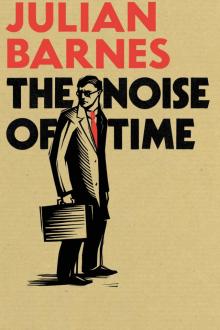 The Noise of Time
The Noise of Time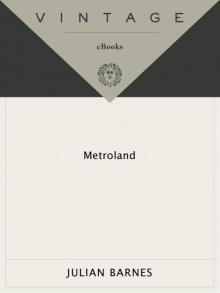 Metroland
Metroland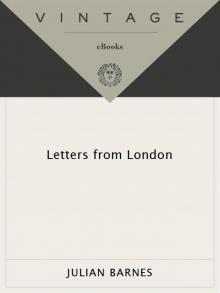 Letters From London
Letters From London Before She Met Me
Before She Met Me Pulse
Pulse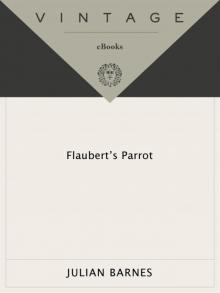 Flaubert's Parrot
Flaubert's Parrot England, England
England, England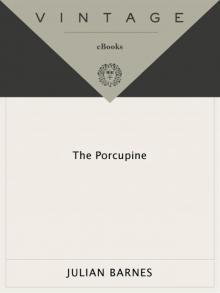 The Porcupine
The Porcupine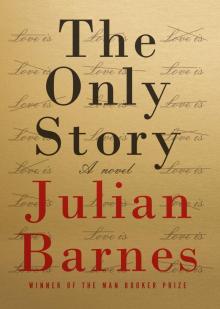 The Only Story
The Only Story Love, Etc
Love, Etc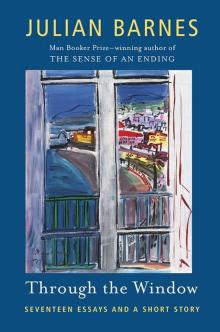 Through the Window: Seventeen Essays and a Short Story
Through the Window: Seventeen Essays and a Short Story Staring at the Sun
Staring at the Sun Cross Channel
Cross Channel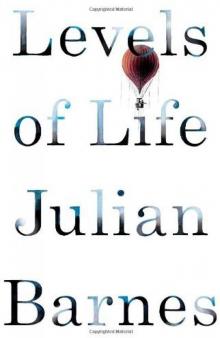 Levels of Life
Levels of Life Arthur & George
Arthur & George Love, Etc.
Love, Etc. A History of the World in 10 1/2 Chapters
A History of the World in 10 1/2 Chapters Something to Declare
Something to Declare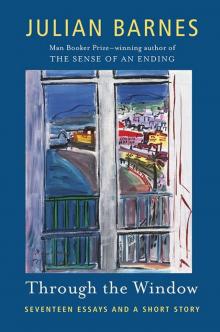 Through the Window: Seventeen Essays and a Short Story (Vintage International)
Through the Window: Seventeen Essays and a Short Story (Vintage International)